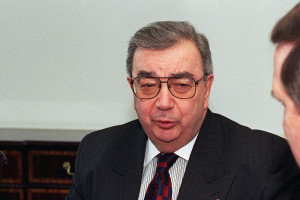TRANSCRIPT: [Putin at] Meeting of Primakov Readings International Forum

(Kremlin.ru – November 30, 2016)
Vladimir Putin addressed a meeting of the International Forum Primakov Readings devoted to studying Yevgeny Primakov’s academic and political heritage.
The International Forum Primakov Readings took place on November 28-30 in Moscow with the support of the Russian Chamber of Commerce and Industry and the Russian Academy of Sciences’ Primakov Institute of World Economy and International Relations.
President of Russia Vladimir Putin: Mrs Primakova, ladies and gentlemen, colleagues, friends,
It is a great pleasure to greet everyone here at the Primakov Readings International Forum. This forum honours the memory and pays its respect to Yevgeny Primakov, outstanding statesman, diplomat, and scholar. It is now 18 months since Mr Primakov left us.
He was truly a person of great scale and many talents, open, responsive, considerate, and honest in his dealings with others.
It is no exaggeration to say that he was a great citizen of our country, a great citizen of Russia. It was absolutely natural and in the order of things for him to work for the good of his country. His effective defence of our national interests, patriotism, and selfless service to our homeland always earned him sincere respect, not only here in Russia, but abroad as well.
As a talented man and original thinker, Mr Primakov left a rich legacy that spans a broad range of fields – state building, academic research, foreign policy, economics, and journalism.
We all know that Mr Primakov was as a highly regarded individual and scholar both here in Russia and abroad. It was on his initiative that the Russian Academy of Sciences established a new department for global affairs and international relations.
He was an outstanding scholar of the Arab world, knew the Middle East in all its subtleties, had a profound understanding of the complicated processes underway there, and when he headed the Institute of Oriental Studies, he turned it into an influential intellectual centre.
Mr Primakov did much to strengthen the authority of the Institute of World Economy and International Relations that today deservedly bears his name. He arrived as a young post-graduate and rose to head the institute in the late 1980s, becoming its director. This prominent academic establishment marks its 60th anniversary this year and is conducting important research. The institute’s heads and staff rightly consider themselves Mr Primakov’s students and worthy successors of the traditions he began.
Mr Primakov avoided formalism, clichés and empty talk in his scholarly work. He always strived to think freely, make balanced and substantial conclusions and, what is particularly valuable, applied his broad knowledge to practice, in his life and work.
We can even speak of a particular method he developed, based on systemic situational analysis that makes it possible to take a comprehensive view of events in politics, the economy, and public life, forecast various development scenarios and propose the optimal action strategy in a particular area.
He used this method when he became Prime Minister of Russia at the height of the difficult crisis that hit the country in August 1998. I emphasise the fact that at this turning point in Russia’s history in the late 1990s, Mr Primakov took on responsibility for preserving civil peace and harmony.
We remember how production fell, unemployment grew, public sector wage arrears and economic debts continued to piled up, and the economy itself was sinking into recession. Few believed then that Russia could pull through this crisis and set itself on a growth track. But take a look at the development trajectory Russia took from there. It ensured the required high growth rates, freed itself from debt, built up large reserves, and is confidently building a modern, socially focused economy.
Later, as President of the Chamber of Commerce and Industry and the Mercury Club, Mr Primakov continued working actively on economic policy matters. He often spoke at events, proposed interesting and original ideas, and earned the business community’s great respect, as he always tried to understand the substance of the real problems business faced and find solutions.
He clearly formulated the Chamber of Commerce and Industry’s position on business development, and communicated it in a well-argued manner to the Government. He proposed effective growth models based on modernising industry and attracting new investment so that the state’s economic efforts would ultimately have a positive impact on the people’s quality of life and prosperity.
Mr Primakov used his deep knowledge, intuition, and managerial talent in the service of our country when he headed the Foreign Intelligence Service, and then the Foreign Ministry. At a difficult period for these agencies, he was able to bolster their influence, reinforce their human resource potential, and preserve and develop their best traditions.
As Foreign Minister, he put great effort into developing a modern foreign policy concept for Russia based on a clear understanding of this country’s real role in international affairs, resting on responsibility for stability and security throughout the world.
Mr Primakov always strove to act as a realist and a pragmatic. He took the view that diplomacy is the art of the possible, and that we should always seek compromise and respect our partner’s position. No matter how irreconcilable the positions of those who sit at the negotiating table are, they can and should find a mutually advantageous solution that suits all parties.
Resolving conflicts through peaceful means alone, and the inadmissibility of intervening in the affairs of sovereign states bypassing the United Nations Charter were also among the principles of international cooperation that Mr Primakov promoted.
To be continued
[featured image is file photo]
